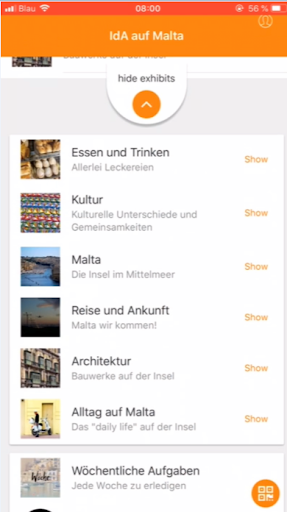- Summary
- Fact Sheet
- Synergy and Transfer
- More Information
The Challenge Abroad project supported socio-economically disadvantaged young adults by providing them with a structured mobility experience in Malta. The project included an eight-week preparatory phase in their hometown, a nine-week stay in Malta with an eight-week internship and a two-week follow-up phase. The preparatory phase focused on linguistic and cultural preparation, career orientation and coaching to prepare participants for the mobility experience. During the placement in Malta, participants were accompanied by educational staff for the first two weeks to help them settle in and provide personalised support as they adapted to the new environment. The experience was further supported by a mobile learning app which encouraged participants to reflect on and document their learning. Upon their return to Germany, the two-week follow-up phase assessed learning outcomes and facilitated planning for next steps in professional integration.
Target Groups:
The project primarily targeted socioeconomically disadvantaged young adults aged 18-35, many of whom face barriers to employment and education. These participants benefited from a tailored international mobility experience and received structured guidance and support to overcome their disadvantages.
Special support required:
To ensure inclusivity, the project implemented a multi-layered support system:
- 8-week preparation phase: Provided language, cultural preparation, career orientation and coaching to ensure that participants were well prepared before travelling abroad.
- Pedagogical Support in Malta: During the first two weeks of the placement, pedagogical staff accompanied the participants to help them adjust to their new roles and environment. This hands-on support was crucial in building confidence and easing the transition.
- Interactive learning app: Participants used a mobile app to document and reflect on their learning experiences. The app presented small, manageable tasks related to Maltese culture, language and daily life, allowing for continuous reflection. Weekly reports were also submitted via the app.
- 2-week follow-up phase: After the internship, participants took part in a structured follow-up to assess their learning and develop an action plan for their next steps, focusing on work integration and further professional development.
Innovation:
The project introduced several innovative elements, including the integration of digital tools through a learning app that guided participants and facilitated reflection during and after their mobility. The app helped participants to become more aware of their environment and provided a framework for documenting learning outcomes. In addition, the presence of educational staff during the initial phase of the placement provided an extra layer of support that is often lacking in mobility programmes, ensuring that disadvantaged learners had the help they needed at the most critical stage of their experience.
This project model shows significant potential for synergy and transfer to other mobility initiatives. The combination of structured preparation and follow-up phases, pedagogical support and a digital reflection tool can be easily adapted to different mobility contexts across Europe. The structured support system, from pre-departure to post-return, can help to reduce barriers for disadvantaged learners in different fields. The project’s approach is well aligned with broader EU strategies to make mobility opportunities more inclusive and accessible, making it highly transferable to other adult education and training context.

